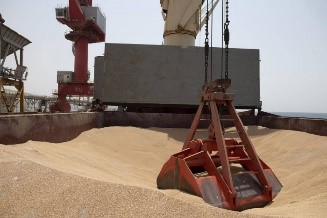
Support for the export of agricultural products from Ukraine was discussed at a meeting of the European Parliament Committee on Agriculture and Development in Brussels.
According to the correspondent of Ukrinform, the deputies also exchanged opinions with the members of the European Commission regarding the risks for EU farmers from the increasing pace of supply of Ukrainian products.
"We monitor volumes, we monitor price dynamics, the import price at the national level, as well as the prices at the EU level, and we publish a monitoring report every two months. So for now, we do not see any very significant negative consequences for the EU agricultural market," said the speaker on this topic, Pierre Bascu, Director of Sustainable Development and Income Support of the Directorate General for Agriculture of the European Commission.
The commission is working on the development of "corridors of solidarity" and reducing transit costs, as it wants "for Ukraine to continue to contribute to global food security and to be able to continue exporting its products to the EU and beyond," the speaker said.
According to MEPs, the "corridors of solidarity" have become a lifesaver for the Ukrainian economy and have allowed the export of more than 108 million tons of goods and the import of 38 million tons of other products for a total amount of 123 billion euros. These volumes increased significantly after the opening of the Black Sea route.
In October, out of 4.5 million tons of grain and other related goods exported from Ukraine, 3.2 million tons passed through the "corridors of solidarity", and about 1.3 million tons went through the humanitarian Black Sea Corridordr.
At the same time, it is necessary to minimize the negative impact on European farmers, say MEPs. In their opinion, the surge in exports to the EU, which is so important for the Ukrainian economy, "had a certain unforeseen effect on some regional markets in the front-line member states, and also caused pressure in certain sectors in the EU."
Vice President of the Agrarian Committee Mazali Aguilar said that Spanish ports are overflowing with grain not only from Ukraine, but also from Russia, at incredibly low prices. “With this pressure of imports, they cannot continue to operate. It is obvious that we must show our solidarity with Ukraine, but not at the expense of our grain producers," she said, calling on the commission to take measures to prevent European grain producers from going bankrupt.
At the same time, Spain, where this year's grain production fell by more than 40% due to unfavorable weather conditions, is now in dire need of grain.
It is necessary to support the transit of Ukrainian grains through the EU to final markets, according to MEPs. Also, some of them suggest, the World Food Fund could be more active and buy back some of these grains.
Unlike grain, the import of Ukrainian sugar to Europe does not cause concern.
"Sugar prices exceed 800 euros per ton, which is extremely high in historical terms. Therefore, the production of sugar in the EU this year, according to estimates, will reach about 15.6 million tons, which means that imports will be necessary," said the chairman of the committee, Norbert Lins.
"We want to see Ukraine as a member of the EU in the future. It is a big producer," said committee member Martin Hoisling. But, according to him, a long-term plan is needed that balances the protection of European producers and aid to Ukraine: "We cannot expect the war to end in three months, we need to get used to this situation."
We will remind you that the European Commission did not extend the ban on the import of Ukrainian grain to neighboring EU countries from mid-September.
At the same time, in order to control Ukrainian exports to the EU and avoid a spike in grain prices, a license system was introduced at the request of the European Union. Such documents can guarantee that grain from Ukraine, intended for a third country, will not remain in one of the "front-line" states, but will transit to the final destination.
As reported, in the 2023/2024 marketing year (started on July 1), Ukraine already exported more than 12 million tons of grain and legumes.




